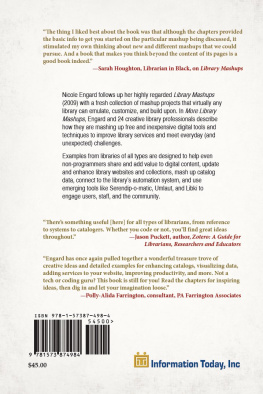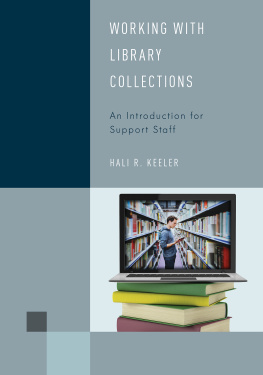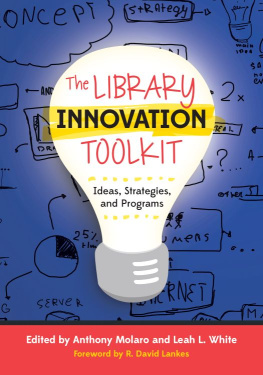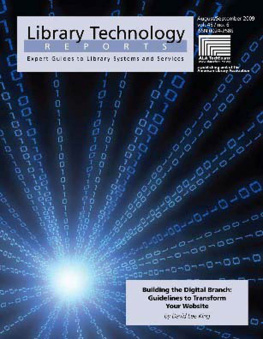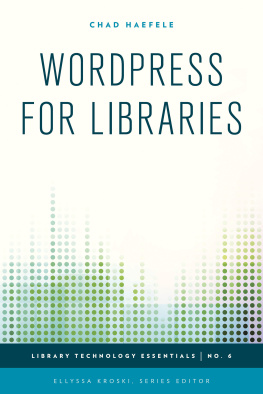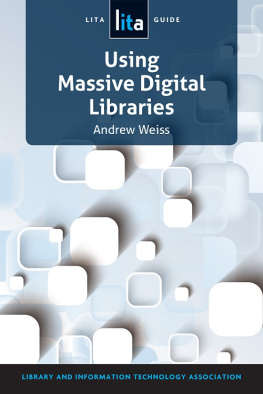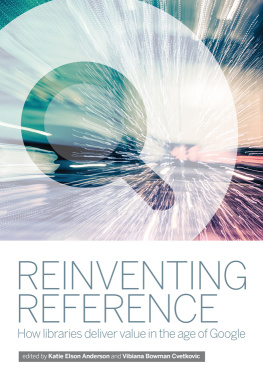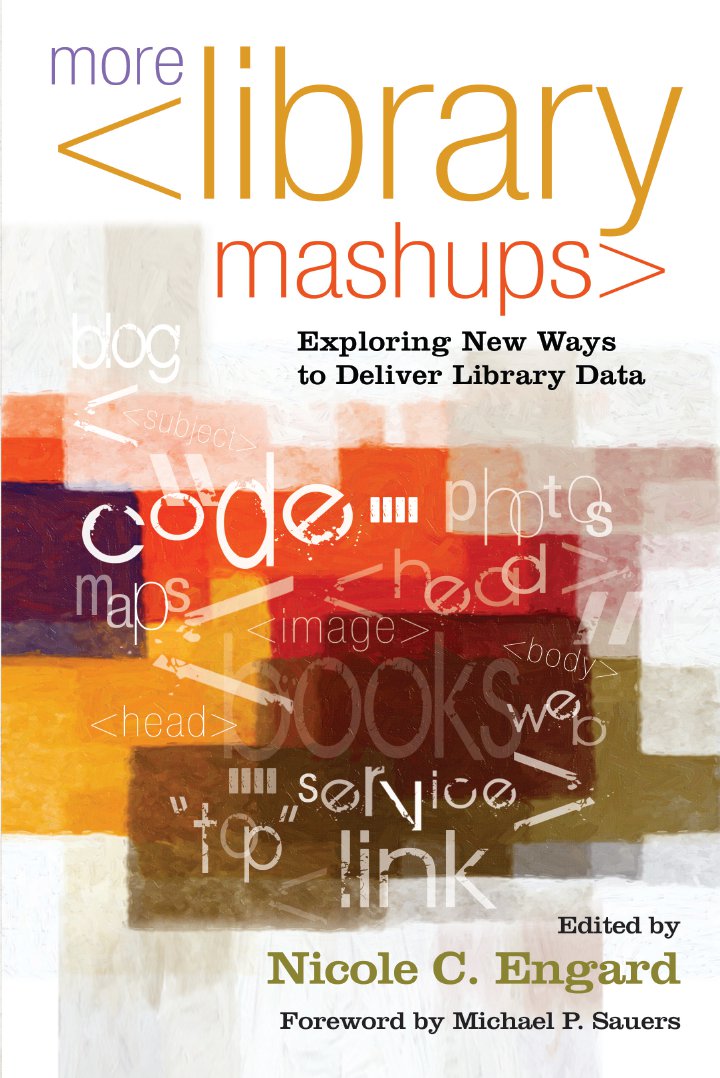
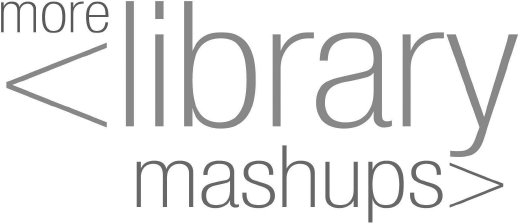

First printing
More Library Mashups: Exploring New Ways to Deliver Library Data
Copyright 2015 by Nicole C. Engard
All rights reserved. No part of this book may be reproduced in any form or by any electronic or mechanical means, including information storage and retrieval systems, without permission in writing from the publisher, except by a reviewer, who may quote brief passages in a review. Published by Information Today, Inc., 143 Old Marlton Pike, Medford, New Jersey 08055.
Publishers Note: The editor and publisher have taken care in preparation of this book but make no expressed or implied warranty of any kind and assume no responsibility for errors or omissions. No liability is assumed for incidental or consequential damages in connection with or arising out of the use of the information or programs contained herein.
Many of the designations used by manufacturers and sellers to distinguish their products are claimed as trademarks. Where those designations appear in this book and Information Today, Inc. was aware of a trademark claim, the designations have been printed with initial capital letters.
Library of Congress Cataloging-in-Publication Data
More library mashups : exploring new ways to deliver library data / [edited by] Nicole
C. Engard.
pages cm
Includes bibliographical references and index.
ISBN 978-1-57387-498-4
1. Mashups (World Wide Web)--Library applications. 2. Libraries and the Internet. 3. Library Web sites--Design. 4. Web site development. I. Engard, Nicole C., 1979
Z674.75.W67M67 2014
020.2854678--dc23
2014033872
President and CEO: Thomas H. Hogan, Sr.
Editor-in-Chief and Publisher: John B. Bryans
Managing Editor: Amy M. Reeve
Production Manager: Norma Neimeister
Book Designer: Kara Mia Jalkowski
Cover Designer: Denise M. Erickson
infotoday.com
To my sisters, Alissa and Kristen,
for being my very first students so many years ago
I would like to thank many people for their support in bringing this second mashup of mashups together. First, I must thank all those of you who read the first edition of this book and kept asking me when we were going to provide you with more great mashup examples. Second, I must thank my colleagues at ByWater Solutions, in particular Brendan and Nate for always supporting me in whatever endeavor I choose to take on.
Id also like to thank the many authors who contributed to this title, making a wide-reaching view of mashups for libraries. Without all of your contributions, this book wouldnt exist. Lastly, I thank my children (shelties, Coda and Beau) for their understanding while I spent more time with my computer than with them over the last year.
mashups.web2learning.net
Each chapter in this book references websites with definitions and examples of mashups. Although links to each of these can be found in Appendix A, the web is not static, and links may move or disappear; even during the editing of this book, several have changed. For that reason, I will be maintaining mashups.web2learning.net, a website that will retain an up-to-date list of links for you to reference whenever youd like. This website will also save you the trouble of having to type cumbersome links by hand; just visit mashups.web2learning.net and choose either the Links page or the chapter the link appeared in from the table of contents, and you will be able to click through to visit the site.
Should you notice any broken links on the site or in the book, please feel free to email me updates at .
Disclaimer
Neither the publisher nor the editor make any claim as to the results that may be obtained through the use of this webpage or of any of the internet resources it references or links to. Neither publisher nor editor will be held liable for any results, or lack thereof, obtained by the use of this page or any of its links; for any third-party charges; or for any hardware, software, or other problems that may occur as the result of using it. This webpage is subject to change or discontinuation without notice at the discretion of the publisher and editor.
Michael P. Sauers
I suspect that most people reading this had the same first encounter with mashups as I did, courtesy of a gentleman by the name of H.B. Reese. His name may not be immediately recognizable to you but the product he invented in 1928 probably is: the Reeses Peanut Butter Cup.
My next encounter with the world of mashups was in 2004 with the release of Danger Mouses The Grey Album. This masterpiece is the result of combining The Beatles The White Album with Jay Zs The Black Album. It was with this that I learned of the term mashup, defined as the combining of two separate yet distinctive musical sources, to create a third, new musical composition. To this day, I still enjoy listening to musical mashups, especially those containing content that Im already familiar with and content that I wouldnt normally listen to. Probably the best example of this would be 2008s American Edit by Dean Gray, a combination of Green Days American Idiot album with other works, ranging from the Doctor Who theme music to Johnny Cash, just to name a couple.
Then, in 2009, mashups dropped into my work life with Nicole Engards 2009 book Library Mashups: Exploring New Ways to Deliver Library Data. With her book, I learned that, beyond food and music, you could mashup data. And, since were librarians, if weve got nothing else, weve got access to vast amounts of data. What I also learned is that data mashups dont have to be hard; you just need to know where the data is and what tools are available.
However, when it comes to mashups, you also have to have the idea, and for many of us thats the hard part. Just because you have the tools and the data doesnt mean you automatically know what to do with them. Sure, before 2008, Id listened to American Idiot many times and had previously heard lots of other music tooespecially the Doctor Who theme. I also had a copy of the audio editing program Audacity. That doesnt mean I realized what I could create with that data and tool.
What I love about More Library Mashups is that not only are the contributors giving me more data and more tools to play with, theyre giving me ideas and inspiring me to look at the resources at hand a certain wayto ask If I took this and that, what could I turn it into?
Keep that question in mind as you read the chapters of this wonderful book. Dont just focus on the exact projects as presented; rather at the end of each one ask yourself, What can I do with this? Take that inspiration, along with the tools and data, go forth, and start mashing!
Nicole C. Engard
Whenever I give a talk about mashups, I like to start with a picture of smores. Its the most delicious type of mashup. The term mashup didnt originate with the smore though; it started in the music industry, as a reference to mixing two or more songs together in various ways. For the purposes of this book, a mashup has to do with taking data from multiple sources and mixing the data together to provide better services for library patrons.

